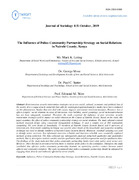| dc.description.abstract | Post terrorism security intervention strategies cut across social, cultural, economic and political lens of
the society. It is a vague area in social life that calls for sociological approach and few studies have been conducted
on this phenomenon. Studies that exist deal with causes, impacts and counter terrorism measures. However, how it
affects peoples’ social relations in areas of interaction, trust building, social groupings, social inclusion/exclusion
has not been adequately examined. Therefore, the study examined the influence of post terrorism security
intervention strategies and its impact on social relations in the County of Nairobi, Kenya. Based on the study, this
paper examines the effect of police-community partnership strategy on social relations. The study adopted a mixed
methods research design using concurrent triangulation technique. It used a sample size of 384 respondents
comprising 361 were heads of households, 15 members of Nairobi County Security Board and 8 survivors of
terrorism acts. Convenient sampling technique was used to select heads of the households and purposive sampling
technique was used to identify members of Nairobi County Security Board. Moreover, snowball sampling was used
to identify terror survivors. Key informants interview schedule and interview schedule were essentially employed
methods of data collection. The data collected was subsequently analysed using both qualitative and quantitative
methods, that is, descriptive statistics mainly used for qualitative data and direct quotation used for qualitative data.
The findings of the study indicated that police-community partnership builds trust when police avert terror acts.
However, when they fail to prevent terrorism, there is mistrust of the police by the community. Therefore, the study
concluded that effective police-community partnership depends on optimizing positive contact between patrol
officers and community members. The study recommends that police-community partnership should be enhanced by
engaging those directly and indirectly affected by terror attacks. | en_US |

